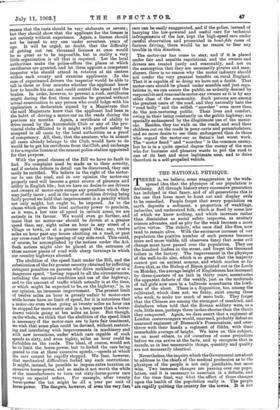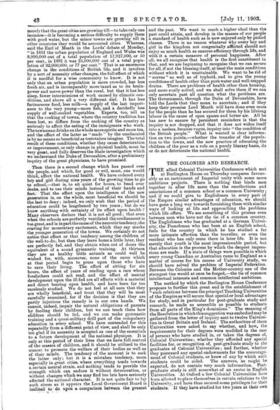THE NATIONAL PHYSIQUE. T HERE is, we believe, some exaggeration in
the wide- spread idea that the physique of our population is declining. All through history every successive generation has indulged in that fancy, and of all generations this is the one that loves most to hunt out and display evils to be remedied. People forget that every population on earth deposits a sediment, a proportion of weaklings, imbeciles, and undersized folk, which is fixed by some law of which we know nothing, and which increases rather than diminishes as social safety improves, as sanitary science advances, and as pity for the weak becomes a more active virtue. The rickety, who once died like flies, now tend to remain alive. With the enormous increase of our population the positive number of such persons becomes more and more visible, till observers fancy that some evil change must have passed over the population. They see the hundred loafers in the street, and forget the thousand toilers in the factory. The improvement in the physique of the well-to-do also, which is so great that the majority cannot put on ancient armour, and which reaches so far down that, as the Bishop of Ripon pointed out in the Lords on Monday, the average height of Englishmen has increased by three-quarters of an inch in thirty years, accentuates the apparent defects of the weakly, just as the multitude of tall girls now seen in a ballroom accentuates the lowli- ness of the short. There is a disposition, too, among the cultivated, which does not, we fancy, exist among those who work, to make too much of mere bulk. They forget that the Chinese are among the strongest of mankind, and disbelieve when told that the Roman soldiery were, as a rule, little men, perhaps three inches shorter than the Gauls they conquered. Again, we dare assert that a regiment of London costermongers would, unarmed, probably defeat an unarmed regiment of Bismarck's Pomeranians, and over- throw with their hands a regiment of Sikhs, with their remarkable average of height. We have on this subject, as on most others, to rid ourselves of some prejudices before we can arrive at the facts, and t9 recognise that in muscle, as in less measurable things, quantity and quality are not necessarily identical.
Nevertheless, the inquiry which the Government are about to address to the chiefs of the medical profession as to the physique of the people is not only justifiable, but most wise. Two immense changes are passing over our popu- lation, and it is necessary to ascertain in a definite, and for the time final, way what the effect of those changes upon the health of the population really is. The people are rapidly quitting the country for the towns. It is not merely that the great cities in growing till—to take only one instance—it is becoming a serious-difficulty to supply them with good water," but the minor towns are growing till in other countries they would be accounted cities. Whereas, said the Earl 'of Meath in the Lords' debate of Monday, " in 1851 the urban population of England and Wales was 8,990,000 out' of a total population of 17,927,000, or 50 per cent., in 1891 it was 25,000,000 out of a total popu- lation of 32,000,000, or 77 per cent." That is an enormous change in the conditions of British life, and it involves by a sort of necessity other changes, the full effect of which it is needful for a wise community to know. It is not only that an .urban population is more crowded, has less fresh air, and is incomparably more taxed as to its brain- power and nerve-power than the rural, but that it has less sleep, fewer intermissions of work caused by climatic con- ditions, and above all a very different diet. It has less farinaceous food, less milk—a supply of the last import- ance to the very young—more fish, and a decidedly less supply of well-cooked vegetables. Experts, too, tell us that the cooking of towns, where the country tradition has been lost, so differs from the cooking of the country as seriously to affect the eating of the immigrants who work. The townsman drinks on the whole more spirits and more tea, and the effect of the latter as " made " by the uneducated is by no means so beneficial as teetotalers imagine. The total result of these conditions, whether they cause deterioration or improvement, or only change in physical health, must be very great,. and .fully deserves the State investigation which we understand the Duke of Devonshire, after a preliminary inquiry of the great physicians, to have promised.
Then there is a second change which has passed over the people, and which, for good or evil, must, one would think, affect the national health. We have ordered every boy and" girl during nine years of the growing time to go to school,—that is, to sit quiet for hours, to bend over desks, and to use their minds instead of their hands and feet,' That the effect upon the intelligence of the new generation is, on the whole, most beneficial we should be the last to deny ; indeed, we only wish that the period of education could be lengthened by two years ; but do we know anything with certainty of its effect upon health ? Many observers declare that it is not all good ; that even when the schools are perfectly ventilated the confinement is too great, and is in part the cause of the neurotic tendency, the craving for momentary excitement, which they say marks the younger generation of the towns. We certainly do not notice that effect or that tendency among the children of the well-to-do; but then they leave home a little later, they are perfectly fed, and they obtain when out of doors the equivalent of a sound gymnastic training. At thirteen they are as healthy little animals as could well be wished for, with, moreover, none of the cares which at that period begin to press upon those who have to earn their living. The effect of sitting for six hours, the effect of years of reading upon a race whose forefathers could not read, and the effect of mental development upon the ill-fed are all effects with a material and direct bearing upon health, and have been far too carelessly studied. We do not feel at all sure that they are wholly beneficial, and trust that they will be most carefully examined, for if the decision is that they are partly injurious the remedy is in our own hands. We cannot, indeed, impair the natural obligations of parents by feeding their children, but we can teach them how children should be fed, and we can make gymnastic training and a quasi-military drill part of the compulsory education in every school. We have contended for this repeatedly from a different point of view, and shall be only too glad If its necessity is accepted as one of the essentials to- a future development of the national physique. It is only at this period of their lives that we have full control of the masses of children, and it should be utilised to the utmost to promote the welfare of their bodies as well as of their minds. The tendency of the moment is to seek tle latter only ; but it is a mistaken tendency, more especially in great cities, where everything tends towards a certain mental strain, and nothing tends to provide the strength which can endure it without deterioration, or without changes which we may find too late have seriously affected the national character. It is not quite fair to lay such stress as it appears the Local Government Board is inclined' 'to' upon a comparison between the present and the past. We want to reach a higher ideal than the past could attain, and develop in the masses of our people a standard of health such as is now enjoyed only by picked classes. There is no reason whatever why every boy and girl in the kingdom not congenitally afflicted should not enjoy as much health as ensures efficiency through life, and with it a certain measure of personal happiness. After all, we all recognise 'that health is the first constituent in that, and we are beginning to recognise that we can secure for all, if not the blessing itself, at least the main conditions without which it is unattainable. We want to be rid of " nerves " as well as of typhoid, and to give the young conditions of health other than pure water and well-trapped drains. There are problems of health other than housing, and more easily solved, and we shall solve them if we can only ascertain past all question what the problems are. The Government, through the Duke of Devonshire, have told the Lords that they mean to ascertain ; and if they keep their promise Lord Meath will have done even more for the people than he has secured for them by his lifelong labour in the cause of open spaces and better air. All he has now to ensure, by persistent reminders is that the inquiry is not dropped, and that it does not widen itself into a useless, because vague, inquiry into " the condition of the British people." What is wanted is clear informa- tion on two points,—whether the transfer of the popula- tion to the towns, and the now practice of educating the children of the poor as a rule on a purely literary basis, do or do not deteriorate the national health.







































 Previous page
Previous page